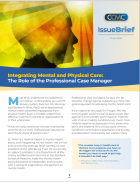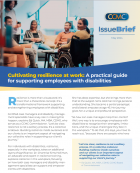Issue Briefs
The role of the professional case manager is changing rapidly. Health reform has called upon the industry to ensure that care delivered is efficient, effective, high quality and low cost. Never in our history has the role and the function of the professional case manager been more important. The expectations of today’s case manager are evolving and the experts in policy, research and industry are talking with the Commission about changes affecting case management practice.
The Commission’s Issue Briefs are offered as part of the CMLearning Network®. Each publication covers topics that are timely and relevant to today’s professional case manager. If you would like a hard copy of an Issue Brief for your staff, or for use at a meeting, we can send you a limited amount at no charge. Simply make your request by filling out the form in the sidebar, and we'll be happy to send them to you.
The Issue Briefs displayed below are the most recent.
Integrating Mental and Physical Care: The Role of the Professional Case Manager
Most of us understand the body/mind connection. Unfortunately, our current delivery system does not. For too long, says Benjamin Miller, PsyD, we’ve approached mental health as something separate from physical health. Such a mindset undermines effective treatment and fails to regard patients in their wholeness.
Ethics is messy: How case managers can balance care, advocacy, and self-preservation
Ethics, as Katherine Brown-Saltzman, MA, RN, aptly describes it, is “messy.” It’s not a formula, nor is it a snap of the fingers. It’s intense, often unpredictable, and layered with complexity. Ethical dilemmas are not just about a single issue and are rarely black and white. “If we can start with that premise, it will help us to understand that there is no absolute with a true ethical dilemma. It’s about trying to find the best resolution,” she explains.
Empathy and Autonomy: Conversations around Medical Aid in Dying from an Anthropological Perspective
Conversations about end-of-life planning are surprisingly as much about the “life” part as the “end.” As part of the research for her book, Scripting Death: Stories of Assisted Dying in America, Mara Buchbinder, Ph.D., became intimately familiar with the heartfelt and often difficult conversations between people facing death, their loved ones, and their providers. Her book chronicles two years of ethnographic research documenting the implementation of Vermont’s Patient Choice and Control at End of Life law (Act 39).
While conducting her research, the professor of social medicine and adjunct professor of anthropology, who serves as core faculty in the UNC Center for Bioethics at the University of North Carolina-Chapel Hill, collected hundreds of stories about the desire for choice and control at the end of life. What she learned, she says, not only involves decisions about death, but about living fully at the end.
Battling the epidemic of social isolation: How case managers can connect clients
Our lack of social connection is creating an “epidemic of loneliness” that threatens our individual and collective health. That’s not just a general observation: It comes directly from the US Surgeon General. The 82-page report from his office - Our Epidemic of Loneliness and Isolation - articulates the problem and identifies solutions. The researchers found that being socially connected not only enhances our emotional well-being but also profoundly impacts our physical health. “Health outcomes are intricately woven with the quality of our social connections,” says MaryBeth Kurland, MPA, CAE, ICE-CCP, CEO of the Commission for Case Manager Certification. “In today's fast-paced world, the significance of our interpersonal connections often goes unnoticed. Yet, our relationships and interactions with family, friends and colleagues play a monumental role in our overall health and well-being.” The fact that roughly half of US adults have reported feeling lonely in recent years--even before the onset of the COVID-19 pandemic—reveals a serious public health issue.




